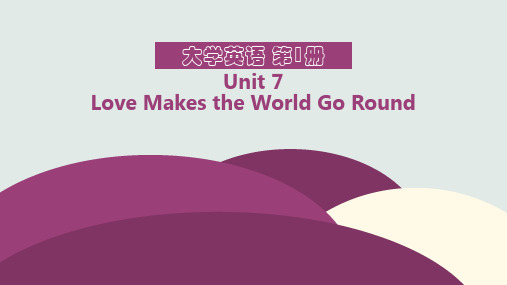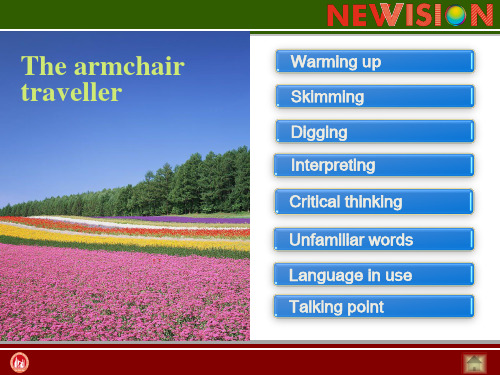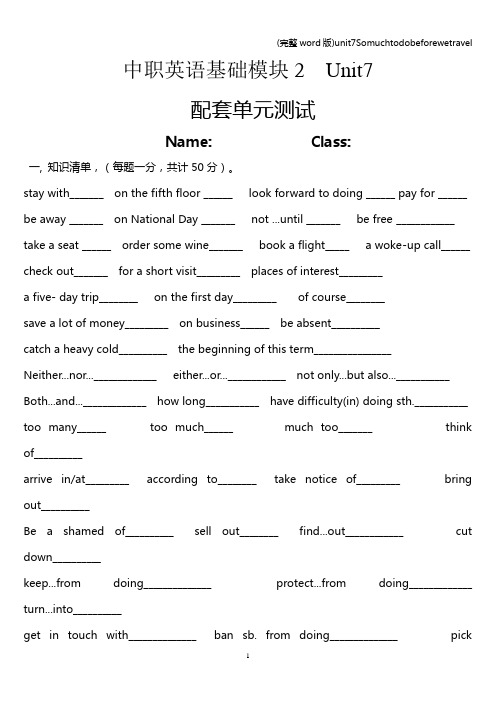Unit 7 Greek stories word pretest
高三英语 unit7 reading课件 人教版

第十二页,编辑于星期五:八点 三十八分。
The dialogue between E & B Pay attention to:
1.want\ have a day off 2. It is convenient for sb. to do sth.
4. happily_______
5. .
F
4. A gentleman arrived at Scrooge’s office because he wanted to collect
5. some money for the poor________
5. Scrooge didn’t want to give thTe poor any money because he was poor
第十七页,编辑于星期五:八点 三十八分。
第十八页,编辑于星期五:八点 三十八分。
第九页,编辑于星期五:八点 三十八分。
listening
第十页,编辑于星期五:八点 三十八分。
True or false:
1. It was cold in Scrooge’s office and Bob had to warm himself over
2. the candle___T______.
2.What is Charles Dickens?
3.What is his nationality?
4. Did he write many famous novels?
5. Can you name some of them
第五页,编辑于星期五:八点 三十八分。
英语1(unit7)

See you!
Beauty is in the Eye of the Beholder
nationality n.国籍;国家 nation n.国家;民族;国民;政府 national a.国家的;国民的 international a.国际的
designer n.设计师;设计者 design v.设计
Beauty is in the Eye of the Beholder
bachelor n.单身汉 bachelor 学士 master 硕士 doctor 博士
Translation (56)
中译英
1.在古希腊奥运会中,只允许男人参加比赛。(participate in)
In the ancient Greek Olympics, only men were allowed to participate in it.
中译英 4.无技能的工人通常比有技能的工人挣钱少。(earn) Unskilled workers usually earn less money than skilled workers.
5.有一本书特别引起她的注意,它很感兴趣地读了几页。 (in particular) One book in particular took his attention and he read several pages with great interest.
大学英语 第1册 Unit 7 Love Makes the World Go Round
Unit7 Topic1 We’re preparing for a food festival

初级中学初二学年英语学科学案课题:Unit7 Topic 1 Section B 课型:听说课授课时间:学案编号:8-7-1B 主编:审核:【学习目标】:1. (1)Learn about the food in different countries:American chocolate cookies, Greek cheese pies, Indian curries, Chinese fried rice, Japanese sushi, Italian pizza, South African beef curry, Russian black bread(2)Learn other new words: western, Indian, Russian, pity(3)Learn some new expressions:That’s good enough. / Wonderful! / What’s more, … / It’s a great pity!2. Go on learning object clauses:I think beef curry is OK.I believe we’ll raise a lot of money for Daniel Igali.3. Social communications:Invitation: May I invite you to our food festival?【重点难点】:if引导的条件状语从句【学习流程】Before-Learning预习:预习新单词I. Read and learn the new words(P126)根据音标熟读单词,同桌互考。
II.Know how to use key words .理解重点词的用法任务二翻译短语1.喜欢吃甜食______________________________~同义短语______________________2.西方食物______________________________3.中国炒米饭______________________________4.筹到很多钱______________________________5.为美食节作准备___________________________________6.没关系_______________ 同义短语_________________________7.喝绿茶__________________8.稍后给你发邮件__________________________________III.预习Section B 内容While-Learning一听听1a 连线(见课件)二听(1) What are Kangkang’s classmates going to do for Daniel Igali?(2) Is Daniel coming to their food festival?(3) How does Kangkang feel when he knows Daniel won’t come to their foodfestival?三听Listen to Pt 3 on Page56.【说的训练】1.Read 1a ,finish1b.2.小组内朗读读对话,然后向全班展示。
新起点大学英语 Unit 7:Active reading

Warming up
Look at the title of the passage and choose the meaning of armchair traveller.
(a) someone who spends their holiday abroad sitting in the hotel
More
Skimming
2 How did he spend the days in his flat? He sat in a relaxed way all day working through good books.
More
Skimming
3 What made him want to go to Provence? A book by Marcel Pagnol made him want to go.
In this unit you will read about two European countries. The first of these has long been a favourite destination for tourists. The passage tells the story of George who dreams of visiting the south of the country, famous for its sunny climate, the beaches on the Mediterranean, and a landscape which has inspired some of the world’s greatest writers. But when George gets to the airport, he has second thoughts about the journey.
王守仁泛读教程第一册 unit 6

Sports Vocabulary
Section A
Word Pretest crawl: v. move slowly, with the body on or close to the ground, or on hands and knees 爬; 爬行; 匍匐行 进 jubilant: adj (fml 文) ~ (about/at/over sth) showing great happiness, esp because of a success 欢欣的, 欣喜的(尤指由於成功) Liverpool were in a jubilant mood after their cup victory. 利物浦队夺得优胜杯後喜气洋洋.
The Beijing 2008 Olympic Games
The Green Olympics (绿色奥运) The Scientific Olympics (科技奥运) The Cultural Olympics (人文奥运) The Olympic ideals; the Olympic spirit (奥林匹克精神) The International Olympic Day (世界奥林匹克日)
The Modern Olympics
THE OLYMPIC MOTTO: faster, higher, stronger
The creed and motto are meant to spur the athletes to embrace the Olympic spirit and perform to the best of their abilities.
Torch relay
(完整word版)unit7Somuchtodobeforewetravel

中职英语基础模块2 Unit7配套单元测试Name: Class:一, 知识清单,(每题一分,共计50分)。
stay with_______ on the fifth floor ______ look forward to doing ______ pay for ______ be away _______ on National Day _______ not ...until _______ be free ____________ take a seat ______ order some wine_______ book a flight_____ a woke-up call______ check out_______ for a short visit_________ places of interest_________a five- day trip________ on the first day_________ of course________save a lot of money_________ on business______ be absent__________catch a heavy cold__________ the beginning of this term________________ Neither...nor..._____________ either...or...____________ not only...but also...___________ Both...and..._____________ how long___________ have difficulty(in) doing sth.___________ too many______ too much______ much too_______ think of__________arrive in/at_________ according to________ take notice of_________ bring out__________Be a shamed of__________ sell out________ find...out____________ cut down__________keep...from doing______________ protect...from doing_____________ turn...into__________get in touch with______________ ban sb. from doing______________ pickup____________throw into___________ get rid of______________ put on weight_____________ take an exam___________ work as______________ keep a good mood______________________二,单项选择题。
大学英语综合版学生用书第七单元unit7
⼤学英语综合版学⽣⽤书第七单元unit7Unit 7 The Glorious Messiness Of EnglishⅡ. History of Englishⅰ. The root of EnglishEnglish began as a west Germanic language which was brought to England by the Saxons around 400 A.D. Old English was the spoken and written language of England between 400 and 1100 A.D. Many words used today come from Old English, including man, woman, king, mother, etc. But Old English was very different from modern English and only a few words can be easily recognized. In the 9th and 10th centuries, when Vikings invaded England, Old Norse words, e.g.sky, take and get and many place names, entered the language.From the Norman Conquest (1066) until the late 12th century English was replaced as the official language by Norman French, though English was still used by the lower classes. English from about 1300 to 1500 is known as Middle English. It was influenced by French and also Latin in vocabulary and pronunciation. French brought many words connected with government, e.g.sovereign, royal, court, legal and government itself. Latin was the language of religion and learning and gave to English words such as minister, angel, master, school and grammar.Literature began again to be written in English during this period. One of the most famous Middle English works i s Chaucer’s The Canterbury Tales.ⅱ. The development of Modern EnglishModern English developed from the Middle English dialect of the East Midlands and was influenced by the English used in London, where a printing press was set up by William Caxton in 1476. English changed a great deal from this time until the end of the 18th century.During the Renaissance, many words were introduced from Greek and Latin to express new ideas, especially in science, medicine and philosophy. They included physics, species, architecture, encyclopedia and hypothesis. In the 16th century several versions of the Bible helped bring written English to ordinary people. The Elizabethan period is also famous for its drama, and Shakespeare’s plays were seen by many people.The development of printing helped establish standards of spelling and grammar, but there remained a lot of variation. Samuel Johnson’s A Dictionary of the English Language (1755) was the first authoritative treatment of English. It defined about 40,000 words and gave examples of their use.By the 18th century American English was established and developing independently from British English. After colonists arrived in the US new words began to be added from Native American languages, and from Fren ch and Spanish. In 1783, soon after Johnson’s dictionary was published, Noah Webster’s The Elementary Spelling Book was published in the US. At first it used Johnson’s spellings, but later editions contained many of what have come to be known as American spellings, e.g. harbor and favorite.ⅲ. 20th Century EnglishDuring the 19th and early 20th centuries many dictionaries and books about language were published. New words are still being added to English from other languages, including Chinese (feng shui) and Japanese (karaoke). Existingwords gain new senses, and new expressions spread quickly through television and the Internet.English is now an international language and is used as a means of communication between people from many countries. As a result the influences on the English language are wider than ever and it is possible that World English will move away from using a British or American standard and establish its own international identity.Ⅲ. Winston Churchillⅰ. A Brief introduction to Winston ChurchillAs a politician, Winston Churchill is remembered as one of Britain’s greatest statesmen. He was the son of the Conservative politician Lord Randolph Churchill and his American wife Jennie. As a young man he served as a soldierin India and Egypt, and as a journalist in South Africa, before entering politics. Churchill became Prime Minister and Minister of Defence in 1940. His radio speeches during World War II gave the British people a strong determination to win the war, especially at times of great crisis. Examples of Churchill’s phrases still often quoted today are “I have nothing to offer but blood, toil, tears and sweat”, and “This was their finest hour”. The Conservative Party led by Churchill lost the election of 1945, but he became Prime Minister again from 1951 to1955 when he retired, aged 80. When he died in Jan 1965 he was given a state funeral.ⅱ. Chronology of Winston Churchill-- November 30, 1874Born Winston Leonard Spencer Churchill at Blenheim Palace, Woodstock,near Oxford.-- October 1, 1911Appointed First Lord of the Admiralty in Liberal government.-- April 30, 1915Failure of the Dardanelles Expedition, in World War I, led to his resignationas First Lord of the Admiralty.-- November 6, 1924Baldwin named him Chancellor of the Exchequer.-- May 10, 1940Appointed to head wartime coalition government.-- July 1945Lost general election.-- April 24, 1953Knighted by Queen Elizabeth II.-- December 10, 1953Awarded Nobel prize for literature in recognition of “historical works andbiographies as well as his brilliant speeches.”-- January 24, 1965Died in London; buried, following a state funeral, in the churchyard at Bladon,near Blenheim.ⅲ. A Video Clip about Winston Churchill(Directions:) Watch this video clip and answer the following questions.1.What do you learn from the clip?2.What do you think of Winston Churchill?Ⅳ. Julius CaesarJulius Caesar was the best-known of all the ancient Roman leaders, and the first one to land in Britain with an army.He did this twice, in 55 and 54 BC, although Britain did not become part of the Roman Empire until nearly a hundred years later.Ⅴ. VikingViking was a member of a people from Scandinavia who attacked parts of northern and western Europe, including Britain and Ireland, in the 8th to 11th centuries. In Britain they were also known as Norsemen. They settled on theScottish islands and in areas of eastern England, and the Danish king Canute ruled England from 1016. The Vikings were feared as violent and cruel, but they were also noted for their skill in building ships and as sailors. They had an important influence on English culture and the English language.Ⅵ. NormanNorman refers to any of the people from Normandy in northern France who settled in England after their leader William defeated the English king at the Battle of Hastings in 1066. The Normans took control of the country, a process known as the Norman Conquest. They used many of the existing Anglo-Saxon methods of government of the state and the church, but added important aspects of their own and made government much more effective. The language of government became first Latin, and then Norman French, and this caused many new words to be added to the existing English language.Ⅶ. William CaxtonWilliam Caxton was the man who set up the first printing firm in Britain. He printed his first book in 1474. By printing books in English, Caxton had a strong influence on the spelling and development of the language. Many of the books he published were French stories which he translated himself. Ⅷ. Otto JespersenOtto Jespersen was a Danish philologist, grammarian, and educationist. He promoted the use of the “direct method” in language teaching with the publication of his theoretical work How to Teach a Foreign Language (1904). Other books include his seven-volume Modern English Grammar (1909~1949).Ⅸ. RenaissanceThe Renaissance emerged in northern Italy in the 1300s when, not content with the abstract and highly subjective thinking of the Middle Ages, scholars turned for inspiration to the ancient Greeks and Romans with their love of earthly life. Italian architects rediscovered ancient construction techniques and incorporated Greek and Roman columns, arches, and domes into their public buildings. Instead of the flat, stiff figures of the Middle Ages, Renaissance artists portrayed rounded, flesh-and-blood people, people filled with emotions. To depict the world they lived in realistically, Renaissance artists developed linear perspective, which creates on a flat surface the illusion of depth. Renaissance scholars explored their world through mathematics, science, and engineering. Probably the most famous people of the Renaissance times are Leonardo da Vinci and Michelangelo. By the 1500s the Renaissance had spread to Spain and the countries of northern Europe, where people sought to blend the intense interest in human affairs with spiritual ideals.Global ReadingⅠ. Part Division of the TextDetailed ReadingⅠ. Difficult Sentences1. (Title) THE GLORIOUS MESSINESS OF ENGLISH1) Translate the title into Chinese.2) What kind of rhetorical device is used in the title?( =1) 英语中绚丽多彩的杂乱⽆章现象.2) The rhetorical device used here is called oxymoron (⽭盾修饰法). An oxymoron puts two contradictory terms together to puzzle the reader, luring him/her to pause and explore why. Here “Glorious” is a commendatory(褒义的) term, while “Messiness” is derogatory(贬义的). As the reader reads on, he/she will know that English is messy, but the messiness reflectssome commendable qualities of English, such as tolerance, the love of freedom, and the respect for others’ rights. At this point the reader cannot but admire the author’s ingenuity.)2. (LL. 9~10) … which French kids are supposed to say instead –but they don’t.Paraphrase this part of the sentence.(= French children are expected to say the word “balladeer” instead of “Walkman” but they don’t say it.)3. (L. 14) Such is the glorious messiness of English.What can we know about the author’s attitude towards English from this sentence?(= He thinks much of it.)4. (LL. 20~21) The history of English is present in the first words a child learns about … (food, water).1. Paraphrase this part.2. Translate this part into Chinese.(=1) The history of English is revealed in the first words a child learns about …2) 英语的历史体现在孩⼦最先学会⽤来表⽰…的词汇当中。
剑桥少儿英语预备级上册unit7
Examples of sentence structure application
Example 3: A: This is my new bag B: Oh, it's nice What color is it?
Examples of sentence structure application
03
Emotional goal
Through the learning of this unit, cultivate students' cross-
cultural awareness and international perspective, and stimulate
their interest and enthusiasm for learning English.
剑桥少儿英语预备级上册unit7
汇报人:XX
contents
目录
• Unit Overview • Vocabulary learning • Mastery of sentence patterns • Dialogue practice • Listening training • Oral expression
03 Mastery of sentence patterns
Analysis of Key Sentence Patterns
Sentence pattern 1: What's this? Sentence pattern 2: It's a/an Sentence pattern 3: Is it a/an?
• Sentence patterns: Master the key sentence patterns of this unit, such as "What do you do at school?", "I play football at school.".
Unit-7-单元测试Word版
Unit 7 Food Festival单元检测第二部分英语知识运用(65分)Ⅰ. 单项选择。
(15分)( )1. —Would you like to come to our food festival?—____A. Yes, I would.B. Of course not.C. Yes, I’d love to.D. No, I wouldn’t.( )2. I don’t know ____ or not he is right.A. thatB. whatC. ifD. whether( )3. —Will you please ____ so much noise, Dongdong?—Sorry. I won’t.A. makeB. not makeC. to makeD. not to make ( )4. —Do you think the students need to have lunch at school?—____ It’s good for them to save time.A. Yes, I think so.B. No, I don’t think so.C. I agree with you.D. I don’t agree with you.( )5. —Which kind of food smells ____ or tastes ____?—Sorry, I don’t know.A. good; wellB. well; badC. good; goodD. well; well ( )6. —Remember ____ off the lights when you leave the room.—OK. I will.A. to turnB. turingC. takingD. to take( )7. Amy makes fewer mistakes than Frank. She does her homework ____.A. more carefullyB. more carelesslyC. more carefulD. more careless( )8. Remember not to have ____ drink.A. too manyB. too muchC. many tooD. much too( )9. When you go to a dinner party, you should ____.A. speak quietB. speak quietlyC. speak fewD. spoke quietly ( )10. Which one goes ____, the car, the train or the plane?A. fastB. fasterC. fastestD. the fast( )11. The menu has so many good things! I can’t decide ____.A. what to eatB. how to eatC. where to eatD. when to eat ( )12. —____ that the 31st Olympic Games will be held in New York.—____ exciting news!A. It said; WhatB. It is said; WhatC. It said; HowD. It is said; How( )13. ____ Lily ____ Milly like pizza. They often say pizza is very delicious.A. Either; orB. Neither; norC. Not only; but alsoD. Both; and ( )14. I did ____ in last English exam and I hardly made mistakes.A. enough goodB. good enoughC. enough wellD. well enough( )15. —How’s the weather tomorrow?—I don’t know if it ____ tomorrow.—Well, if it ____, I won’t go out with you.A. will rain; will rainB. rains; rainsC. rains; will rainD. will rain; rainsⅡ. 情景交际。
英语听力入门第二册-unit7
unit 7 For the glory of sportaims: place name and date of some yearsdifficulties: proper names and special termspart 1A.Vocabulary:Hemisphere: a top or bottom half of a globeA half of a sphere; 半球eg. If you cut a round fruit into two, each half is a hemisphere.如果你把一个圆的水果切成两半,每一半就是一个半球。
eg. The Northern Hemisphere is the part of the world north of the equator, and the Southern Hemisphere is south of the equator.北半球是地球赤道以北的部分,南半球是赤道以南的部分。
Melbourne: ['melbən] 墨尔本A city of southeast Australia southwest of Canberra. Settled in 1835, it was the seat of the Australian federal government from 1901 to 1927. The Summer Olympics were held here in 1956. Metropolitan area population, 2,722,817.澳大利亚东南部城市,位于堪培拉西南处。
建于1835年,从1901年至1927年一直为澳大利亚联邦政府所在地。
1956年之夏季奥运会在此地举办。
城市人口2,722,817A city of east-central Florida on Indian River south of Cocoa Beach. It is a winter resort with varied light industries. Population, 59,646.Munich: ['mju:nik] 慕尼黑A city of southeast Germany near the Bavarian Alps southeast of Augsburg. Founded in 1158, it has long been the center of Bavaria. Adolf Hitler organized the Nazi Party here after World War I and signed the MunichPact, widely regarded as a symbol of appeasement, with Great Britain, France, and Italy in 1938. The city was largely rebuilt after extensive Allied bombing in World War II. Munich was the site of the 1972 Summer Olympics. Population, 1,267,451.慕尼黑德国东南部城市,位于奥格斯堡东南,靠近巴伐利亚州境内的阿尔卑斯山脉。
